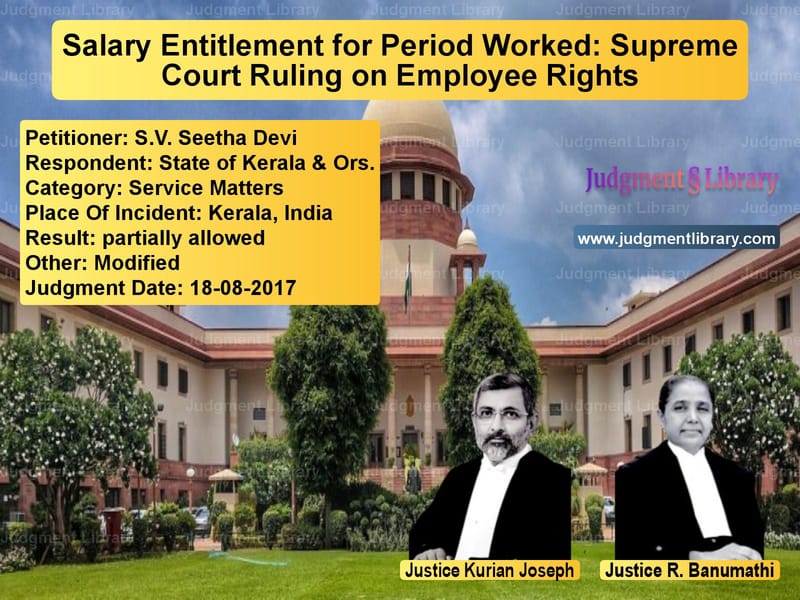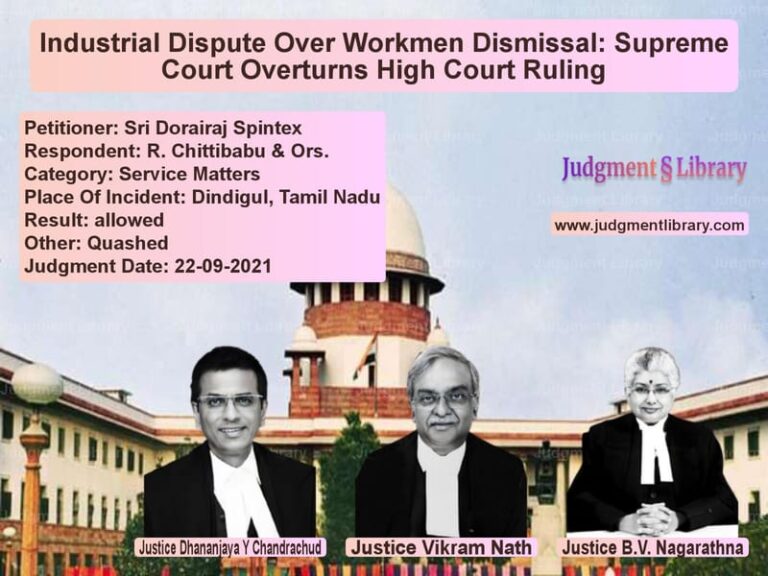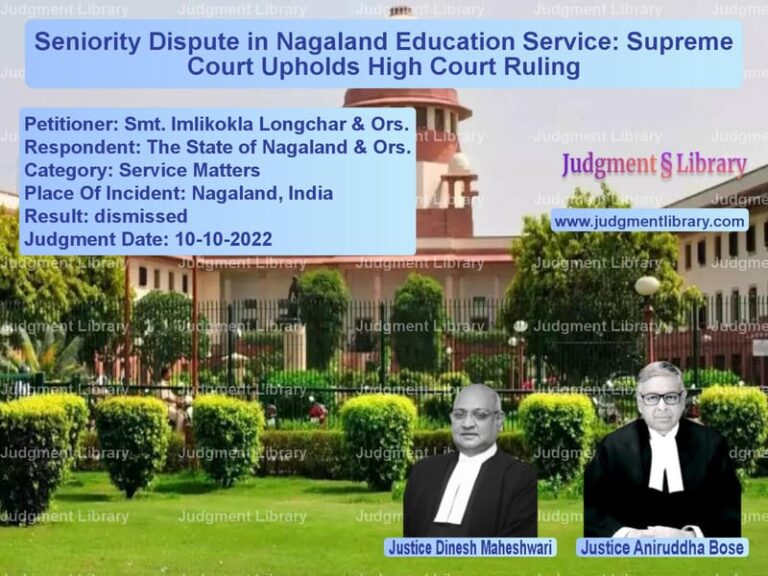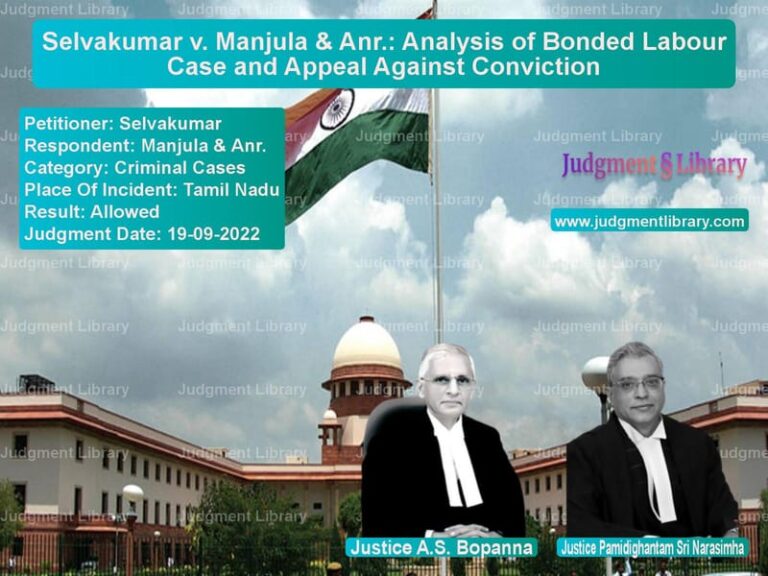Salary Entitlement for Period Worked: Supreme Court Ruling on Employee Rights
The case of S.V. Seetha Devi vs. State of Kerala & Ors. is a notable Supreme Court judgment concerning the entitlement of salary for the period an employee has worked, despite ongoing legal proceedings. The appellant sought remuneration for the time she had served under an interim order of the High Court, which was later set aside.
The Supreme Court, in its ruling, upheld the principle that an employee should be paid for the work performed, even if their employment was later deemed invalid. The judgment emphasizes fairness and equity in employment matters.
Background of the Case
The appellant, S.V. Seetha Devi, was appointed to a position in the State of Kerala and continued in service based on an interim order of the High Court. However, when the final judgment was delivered, her appointment was nullified.
Despite this, the appellant had worked during the period covered by the interim order. She approached the Supreme Court seeking salary for the time she had actually served. The High Court had denied her salary, citing the invalidation of her appointment.
Key Legal Issues
- Whether an employee is entitled to salary for the period worked under an interim court order, even if the final judgment nullifies the employment.
- Whether the employer (State of Kerala) had a legal obligation to compensate the appellant for work performed.
- Whether the principle of natural justice and equity applies to salary claims in such cases.
Arguments by the Petitioner (S.V. Seetha Devi)
The petitioner, through her legal counsel, argued that:
- She had worked in good faith under a valid interim order of the High Court.
- It was unjust to deny her salary for work she had already performed.
- She had discharged her duties in accordance with the law, and invalidation of her appointment should not deprive her of rightful earnings.
- The employer had received the benefit of her services and should be legally obligated to compensate her.
Arguments by the Respondent (State of Kerala)
The State of Kerala, represented by legal counsel, countered with the following arguments:
- The appellant’s appointment was ultimately declared invalid, meaning she was never legally entitled to salary.
- Since the High Court had already ruled against her employment, there was no obligation to pay her for the period she had worked.
- Allowing salary claims in such cases could set a precedent encouraging employment disputes without merit.
Supreme Court’s Judgment
The Supreme Court, in a judgment delivered by Justice Kurian Joseph and Justice R. Banumathi, ruled in favor of the appellant, modifying the High Court’s order to the extent of salary entitlement.
1. Fairness and Equity in Employment
The Court held that an employee who has worked under an interim order should be compensated:
“Though we are not inclined to interfere with the impugned order, as far as the relief regarding salary for the period the appellant has worked is concerned, we are of the view that it would be just proper and equitable to pay the salary to the appellant.”
2. Employee’s Right to Compensation
The Court ruled that the employer could not unjustly enrich itself by denying salary for services received:
“The appellant shall be entitled to the salary for the period she has actually worked, pursuant to the interim orders passed by the High Court.”
3. Direction for Payment
The Court directed the State to make the payment within a stipulated time:
“In case, the salary for the said period has not already been paid, the same shall be paid within a period of three months from the date of production of a copy of this order.”
Key Takeaways from the Judgment
- Salary for work done must be paid: Employees cannot be denied wages for work they performed under valid court orders.
- Judicial fairness in employment matters: The ruling reinforces that courts must balance legal compliance with principles of equity.
- Protection against unjust enrichment: Employers cannot benefit from an employee’s services without compensating them.
- Precedent for salary disputes: The decision provides clarity on compensation rights in cases where employment is later nullified.
Impact of the Judgment
This ruling has significant implications for employment law, ensuring that:
- Government employees who work under interim orders cannot be denied their rightful wages.
- Employers must honor compensation claims when they have utilized an employee’s services.
- Court rulings on employment must consider fairness and natural justice.
Conclusion
The Supreme Court’s ruling in S.V. Seetha Devi vs. State of Kerala & Ors. upholds the principle that employees who work under a legally valid order must be compensated for their labor. By modifying the High Court’s judgment and directing payment of salary, the Court reinforced fairness and equity in employment-related disputes.
This decision provides a guiding precedent for future cases involving salary entitlements and ensures that employees are not left without recourse due to procedural complexities.
Don’t miss out on the full details! Download the complete judgment in PDF format below and gain valuable insights instantly!
Download Judgment: S.V. Seetha Devi vs State of Kerala & Or Supreme Court of India Judgment Dated 18-08-2017.pdf
Direct Downlaod Judgment: Direct downlaod this Judgment
See all petitions in Employment Disputes
See all petitions in Public Sector Employees
See all petitions in Termination Cases
See all petitions in Judgment by Kurian Joseph
See all petitions in Judgment by R. Banumathi
See all petitions in partially allowed
See all petitions in Modified
See all petitions in supreme court of India judgments August 2017
See all petitions in 2017 judgments
See all posts in Service Matters Category
See all allowed petitions in Service Matters Category
See all Dismissed petitions in Service Matters Category
See all partially allowed petitions in Service Matters Category







